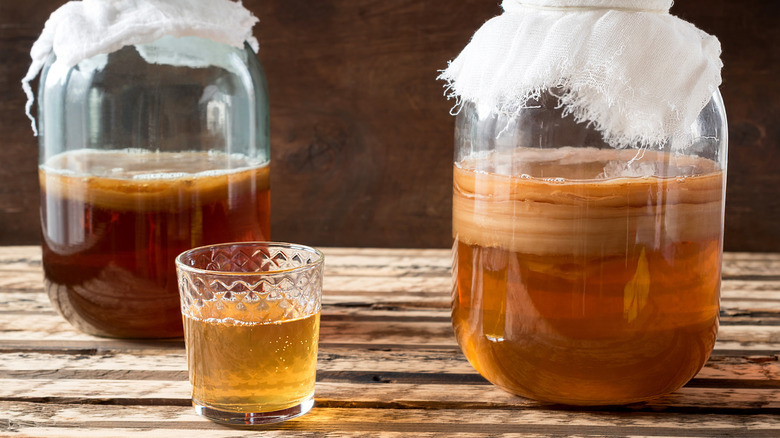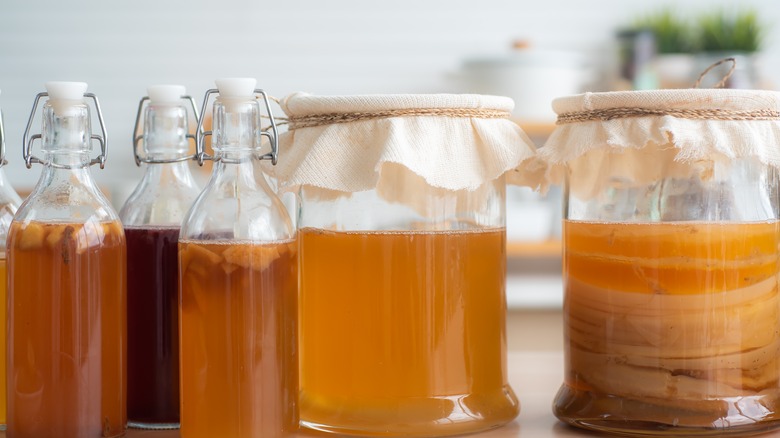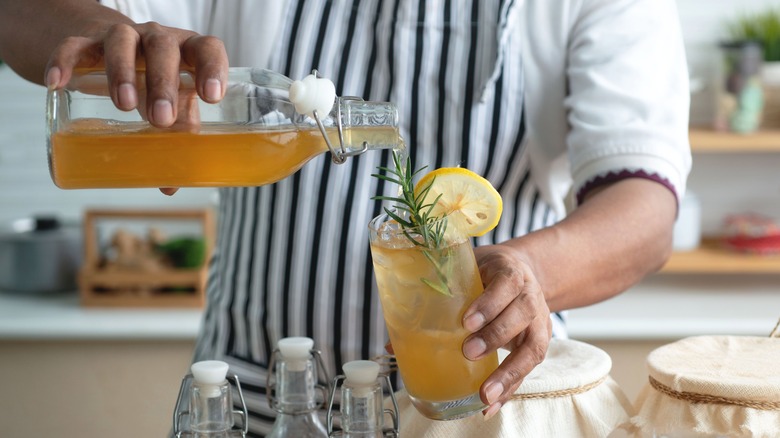Here's What Those Brown Strings In Kombucha Really Are
Though kombucha has been near-universally marketed as a health drink, we know it's not meant for everyone. With a distinct bittersweet taste and an off-putting appearance, this fermented tea can take a moment to warm up to. Sometimes thick, sometimes stringy — what are those brown floating pieces, and are they good for you? Is it safe to drink the entire bottle, or should you leave those little jelly pieces in the bottom of a cloudy glass?
Fear not! Whether you're trying the brew for the first time at your neighborhood farmers' market or drinking a cup regularly for gut health, know that even the most converted kombucha enthusiasts can take pause at the sight of floating debris. We have a few tips for you if you're readying yourself to step onto the kombucha tasting train and can't seem to stomach the thought of drinking any beverage with floaties in it.
The kombucha process
Kombucha is a fermented beverage made from a gelatinous hunk of bacteria and yeast called a SCOBY (short for "Symbiotic Culture of Bacteria and Yeast," pronounced skow-bee). According to Scientific American, once this glob is mixed with sugary tea, a week-long chemical interaction results in a bubbly brew. Similar to "the mother" in apple cider vinegar, this floating stuff — including the strands left over in the final product — is nature's guarantee that the end product is unfiltered, unprocessed, and unique.
As the mixture matures, the taste of kombucha can range from sweet to acidic. This is why it's possible to find an assortment of flavors, colors, and varieties of kombucha at local markets. Using different teas and sweeteners, kombucha brewers can incorporate their own preferences into their batches. Larger brewers sometimes pasteurize their kombucha or strain mixtures to sell in bulk. So while you may find one brew that is clear and sweet, another sample could be herbal and strong.
Natural freshness guaranteed — strings attached
The most experienced brewers know how to sample and observe kombucha to produce the perfect flavor. So while SCOBY strands can be intimidating to witness, those strings are actually reassurance of the freshness of the beverage. "Floaters" are never the most appealing to see in any drink, but they are harmless in kombucha. Be wary of any moldy or green objects, however. (If you see anything that resembles mold floating on the top of your glass or if the kombucha smells more like vinegar than cider, take a hard pass!)
Now that you know the floating strands are, in fact, a natural kombucha byproduct, get adventurous with a kombucha coffee or float. If you can't bring yourself to ingest the thicker pieces, use a strainer to enjoy a refreshing glass. With health benefits ranging from antioxidant support and reduced cholesterol levels to a probiotic boost (via Medical News Today), kombucha is worth a try — brown strings and all.


